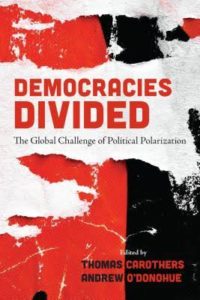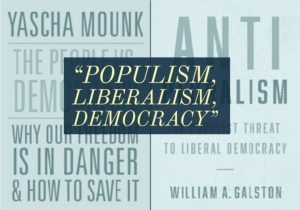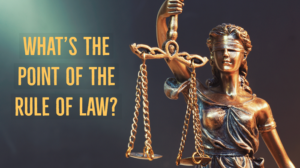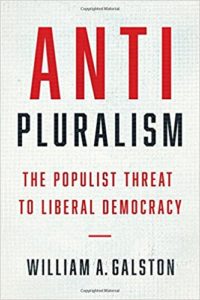Political polarization is “tearing at the seams of democracy” around the world, according to Thomas Carothers, Carnegie senior vice president for studies. What can be done to overcome polarization and rebuild consensus, he asks (above).
The relationship between populism and polarization is more complex than anticipated, says former Carnegie junior fellow Andrew O’Donohue. In some states, like Poland, illiberalism fueled polarization, while in others, like the United States, pre-existing divisions prompted populist resurgence.

National Endowment for Democracy
The United States may look much like many other angry, divided countries, but its brand of polarization raises specific concerns about the future and functioning of its democracy, they write for Foreign Affairs:
What is more, polarization in the United States is especially multifaceted. In most cases, polarization grows out of one primary identity division—usually either ethnic, religious, or ideological. In Kenya, for instance, polarization feeds off fierce competition between ethnic groups. In India, it reflects the divide between secular and Hindu nationalist visions of the country. But in the United States, all three kinds of division are involved.
 “Thankfully, the United States has many traditions and institutions that help its democracy hold together in the face of the centrifugal pressures: above all, the country has a deep attachment to the rule of law, constitutionalism, and the idea of democracy itself,” Carothers and O’Donohue add. “But not everything that makes the United States politically distinctive works against polarization. And if Americans fail to tackle this issue in the years ahead, tribalism may become an entrenched part of our political system—a tradition as American as apple pie.”
“Thankfully, the United States has many traditions and institutions that help its democracy hold together in the face of the centrifugal pressures: above all, the country has a deep attachment to the rule of law, constitutionalism, and the idea of democracy itself,” Carothers and O’Donohue add. “But not everything that makes the United States politically distinctive works against polarization. And if Americans fail to tackle this issue in the years ahead, tribalism may become an entrenched part of our political system—a tradition as American as apple pie.”
Western democracies are in various states of crisis, struggling to contain a resurgent populism, argues Brookings analyst Richard Reeves. For liberal democracy to recover, we will have to recast prevailing liberal philosophy, politics and economic policy, he writes for The Guardian:
Philosophically, liberals will have to start by eating many slices of humble pie. It turned out to be a terrible mistake to assume that capitalism and democracy naturally go hand in hand. Perhaps an understandable one, given a certain historical view. Liberal democracy and liberal capitalism were, after all, twins, born of the European Enlightenment. But as history has shown repeatedly, they can be separated. It is simply wishful thinking to believe that some deep natural processes drive liberal causes. They have to be fought for, over and over and over again.

National Endowment for Democracy
The threats the constitutional system faces now are serious: populism; technological advances that humans seem ill-equipped to navigate; widespread dissatisfaction and ennui among citizens whose active participation in the American project is a prerequisite for its success, The Atlantic observes.
How does a system that is more than two centuries old meet the challenges of today? A growing number of people argue that it can’t. To answer many of these fundamental questions, The Atlantic, in partnership with the National Constitution Center, is embarking on a year-long exploration of the issues and controversies surrounding the Constitution. RTWT
On the other hand, “this week’s events provide evidence that liberal democracy is resilient — perhaps more resilient than we thought — and will not simply roll over and die,” one commentator observes. Rule of law is an especially vital constraint on illiberal populists, observers attest.

National Endowment for Democracy
It is one of the ironies of the rise of authoritarian movements in Western democracies that politicians who claim to be strengthening the foundations of democracy work so assiduously to undermine those foundations. So it was especially satisfying when Britain’s Supreme Court soundly and unanimously slapped down Prime Minister Boris Johnson’s brazen attempt at an end-run around Parliament to pull Britain out of the European Union, The New York Times adds.
This week’s UK Supreme Court decision is a telling illustration of why all populist authoritarians need to dismantle the independent judiciary, adds Conor Gearty, Professor of Human Rights Law at the London School of Economics. If Johnson were given the election he wants, his rabble-rousing might well deliver a majority as it has in the past for the likes of Putin, Erdogan and Orbán, he writes:
But they all have needed to destroy the courts and on his current form, Johnson would have followed that path had he had the chance to score a populist victory at the polls. In one of the odder quirks in this unfolding drama, representative democracy and the rule of law may owe their survival to the inflexibility of the Fixed-terms Parliament Act, preventing the PM from playing the populist card.
 Movements and politicians claiming the mantles of populism and nationalism have risen to prominence in democracies around the globe. They often promote varying, even contradictory interpretations of these concepts, but all challenge existing institutions—often in the name of democratic empowerment, notes the Center for Middle East Policy at Brookings. On October 7, the Center for Middle East Policy at Brookings and the Israel Democracy Institute in Jerusalem host an expert panel to discuss the tensions between populist, nationalist, and democratic impulses around the world today.
Movements and politicians claiming the mantles of populism and nationalism have risen to prominence in democracies around the globe. They often promote varying, even contradictory interpretations of these concepts, but all challenge existing institutions—often in the name of democratic empowerment, notes the Center for Middle East Policy at Brookings. On October 7, the Center for Middle East Policy at Brookings and the Israel Democracy Institute in Jerusalem host an expert panel to discuss the tensions between populist, nationalist, and democratic impulses around the world today.
Panelists will include Yael (Yuli) Tamir, Israeli political theorist, former minister of education of Israel, and the author of “Liberal Nationalism” (1993) and “Why Nationalism” (2019); former National Endowment for Democracy board member Bill Galston, senior fellow in the Governance Studies program at Brookings and author of “Anti-Pluralism: The Populist Threat to Liberal Democracy,” and Shany Mor, associate fellow with the Hannah Arendt Center at Bard College and former director for foreign policy at the Israeli National Security Council. Natan Sachs, director of the Center for Middle East Policy at Brookings, will moderate the discussion.
Democracy, nationalism and populism: The U.S., Israel, and beyond
Monday, October 7, 2019, 10:00 – 11:30 a.m. The Brookings Institution, Saul/Zilkha Room
1775 Massachusetts Avenue, N.W. Washington, D.C. 20036 RSVP







